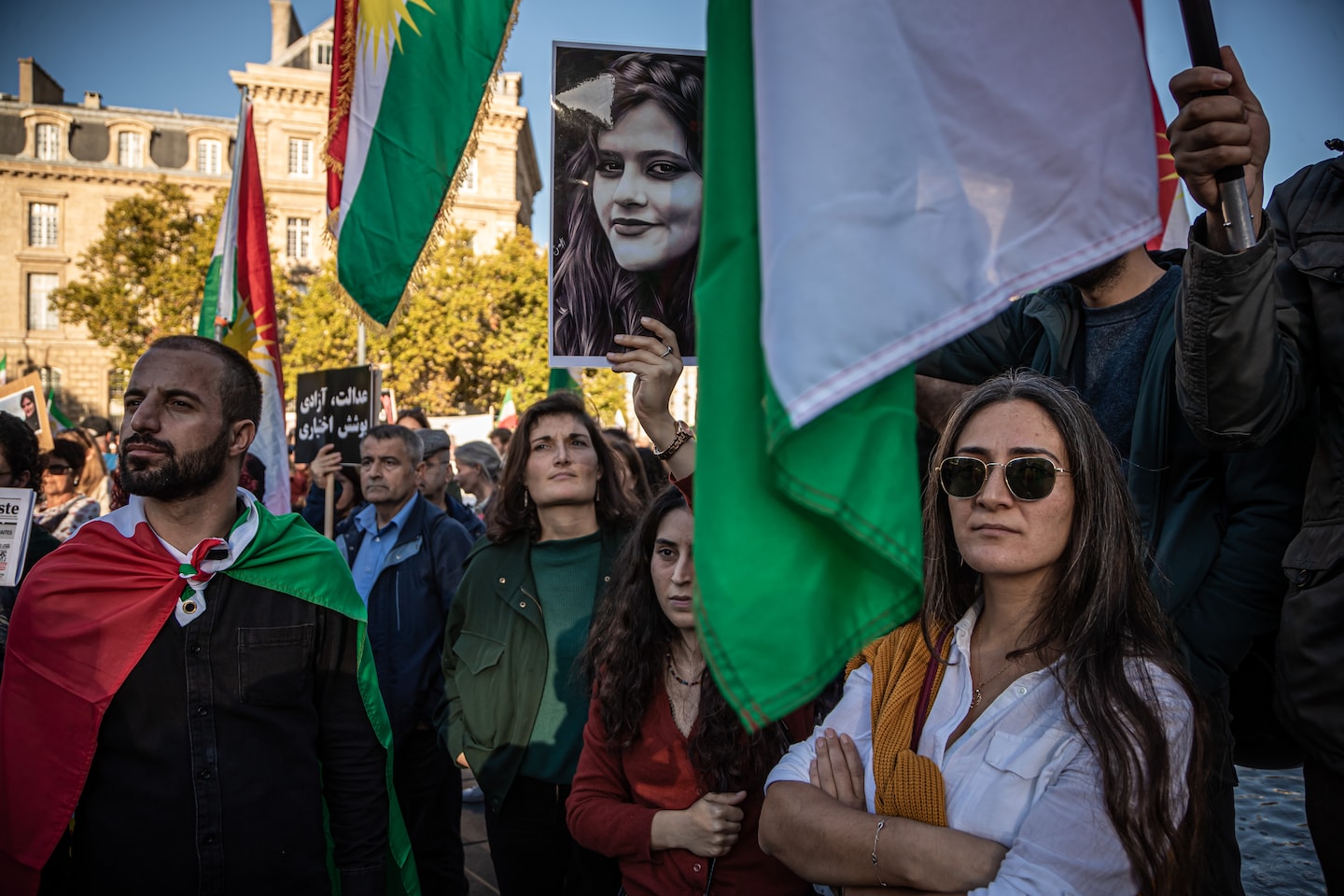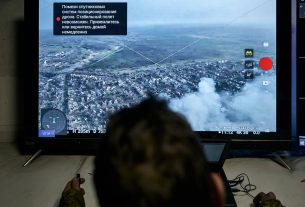The couple was part of a group departing a Nov. 3 ceremony to honor Hadis Najafi, a young woman who was killed in September during an anti-government protest. Ghare-Hassanlou and his wife exited their car to see why traffic had stopped and entered a scene of chaos.
Videos taken at the scene, aired by state media outlets and shared widely on social media, showed protesters brutally beating a member of the Basij, a volunteer paramilitary force connected to the Revolutionary Guard, in the road, hitting, kicking and dragging him as he lies motionless. In one video, Ghare-Hassanlou’s wife appears to be trying to restrain the mob.
“Farzaneh tried to stop them but she was not successful,” said Hooman Hosseini Nik, a radiologist who completed his residency with Hamid in Iran and now lives in Canada.
That night security forces raided the couple’s home and arrested them, beating them in front of their 14-year-old daughter, said Behrad Sadoughian, a former classmate of Ghare-Hassanlou in Iran who now lives in Canada and has been following the case closely. A member of the security forces grabbed Ghare-Hassanlou, a radiologist known for his charitable work, by the hair, putting a knife to his throat and demanding to know where the couple kept weapons, Sadoughian says. He heard accounts of the night from those close to Ghare-Hassanlou.
Friends and family members, some of whom spoke on the condition of anonymity, fearing for their safety, argue that there is no evidence to indicate that the couple participated in the violence against the Basij member, Ruhollah Ajamian. In addition, family members who said they spoke to the couple before their arrest recall them saying they came to the aid of a cleric who had been severely beaten nearby.
In a video posted online by the state-backed Fars news agency, the cleric, identified by local media as Yasser Esmaili, describes how two people helped him at the time he was assaulted. In particular, he notes that a woman wearing an improper hijab stood near him and prevented the mob from attacking him again. Family members say this matches what Farzaneh Ghare-Hassanlou told them.
On Dec. 5, Ghare-Hassanlou was sentenced to death and his wife was handed 25 years for her alleged role in the death of Ajamian, the Basij member. Family members, friends and human rights groups say the couple did not have adequate legal representation.
At least 15 people faced charges in Ajamian’s death; five of them, including Ghare-Hassanlou, received death sentences.
At least 11 people, according to the New York-based Center for Human Rights in Iran, have been sentenced to death in connection with the protest movement, which began in September following the death in police custody of Mahsa Amini, 22, after she was detained for allegedly violating the country’s conservative dress code for women. More than 500 people have been killed and some 18,000 arrested amid the protests, according to the HRANA activist news agency. Accurate figures are difficult to ascertain.
“The way the authorities are using the death penalty in this case is to instill fear in the public,” said Nassim Papayianni, an Iran campaigner at Amnesty International. “To send a message that regardless of who you are and what your story or background is we can arrest you in connection to these protests and we can quickly do sham expedited proceedings to sentence you to death.”
Observers, friends and family members say that even though neither Ghare-Hassanlou participated in the killing, the judiciary is using the case as a means of discouraging doctors and other professionals from taking part in the protest movement. Doctors treating protesters have been targeted by police, the British Medical Journal reported.
This month, the government has executed two protesters, both of them 23-year-old men, for allegedly attacking security forces. Observers say the judicial process that led to their execution was rushed and inadequate. One of the men, Majid Reza Rahnavard, was hanged from a crane with a bag over his head and his hands bound behind his back, 23 days after his arrest.
When first in custody, the Ghare-Hassanlous were permitted outside contact. Word has gotten out about their condition: Both have been tortured, family members and friends allege.
“His ribs were broken during interrogations,” said Hassan Ghare-Hassanlou, Hamid’s brother who lives in the Netherlands, who is in touch with others close to Hamid. “One of the ribs led to the bleeding in his left lung.” A statement from Amnesty International said that sources close to Hamid reported he had received three surgeries to address the internal bleeding.
He is being held in a hospital, family members say. A photo of him in the hospital obtained by The Washington Post shows bruises on his left leg and the left side of his body. On the day scheduled for Ghare-Hassanlou’s first court appearance, his doctor recommended that he join the court via video link because his health was not stable, according to friends and family members. Security agents took him to go to court anyway.
Ghare-Hassanlou’s wife, Farzaneh, was beaten on the head with a baton and both her teenage daughter and an older son were threatened with violence unless she confessed against her husband. She agreed to say her husband had kicked the militia member once but wrote a letter the following day rejecting the confession, which she said was obtained under torture and duress. She also rejected the confession in court, family members, friends and human rights groups say.
Many have rallied to support the couple. One online petition to free them has accrued more than 150,000 signatures. Molavi Abdol Hamid, a prominent Sunni cleric in the city of Zahedan who has become one of the government’s most outspoken critics since the protests began, spoke out about the case at Friday prayers last week.
“This doctor is a philanthropist and has worked for many people,” he said. “Everyone’s request is that you free Dr. Hamid Ghare-Hassanlou and his family.”
Ghare-Hassanlou is known in Iran for charitable fundraising and for helping organize the construction of rural schools. In a video posted online last week, a group of girls who are students at one such school asks for him to be freed.
“The judiciary is moving very fast on these issues,” said Ghare-Hassanlous’ brother Hassan. “In the case of the two people who were recently executed it was only about a month for their trial and execution. International pressure can take away this speed.”



